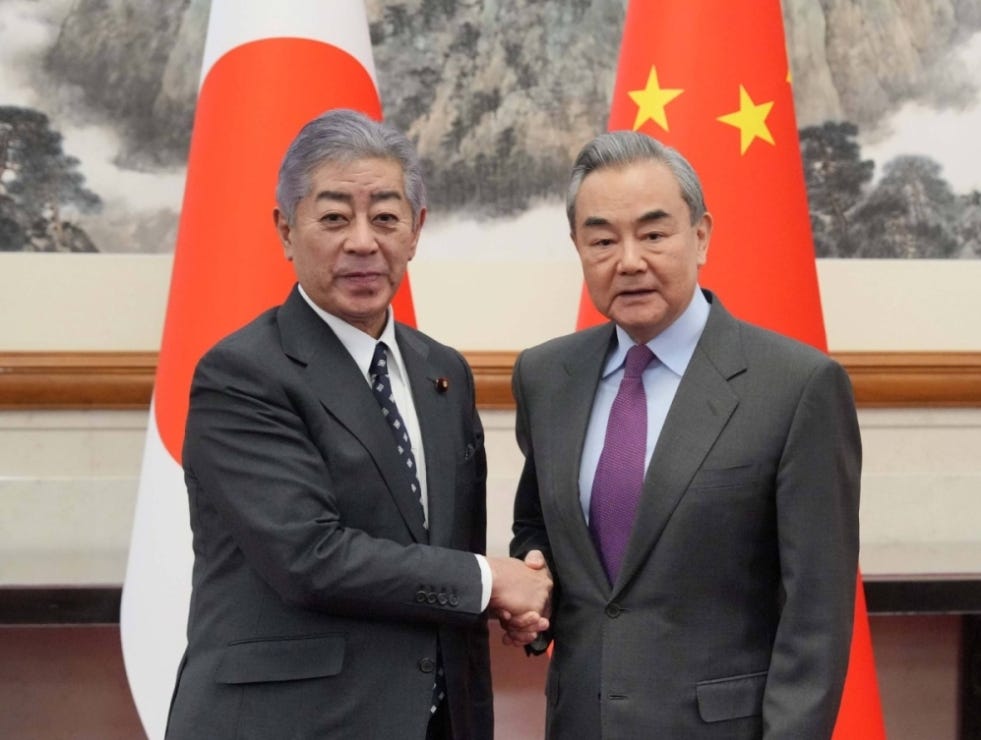First geopolitical domino falls, even prior to Trump's taking office
I don’t know how many things will change during Trump’s second term. But I think something began to change even before he takes office. It reminds us how close the world is interconnected.
Japanese Foreign Minister Iwaya Takeshi visited China on December 25-26. He announced that Japan will grant ten-year tourist visas for Chinese nationals. It is seen as a friendly gesture from the Japanese side, and a positive sign of bilateral relations after several years of cold period.
Agreements between both sides during his meeting with Chinese top diplomat Wang Yi included to create an environment conducive to promoting people-to-people exchanges.
In fact, there was another sign implied that China-Japan relations are improving. On November 15, 2024, Chinese President Xi Jinping met with Japanese Prime Minister Shigeru Ishiba on the sidelines of the 31st APEC Economic Leaders' Meeting in Lima, Peru.
Japan-U.S. relations is very complicated to understand. They are military allies and economic competitors. Japan is now the biggest foreign debt owner of the United States. The U.S. trade in goods deficit with Japan was 71 billion dollars in 2023 and 57 billion dollars in the first 10 month of 2024.
It is not clear what kind of policy Trump will take toward Japan. Based on his previous remarks, many people believe that he will impose additional tariffs on Japan, demanding that Japan pay more for defense, purchase more American oil, natural gas and weapons.
It can be imagined that, in line with Trump's non-interventionist foreign policy mindset, if a conflict breaks out between Japan and one of its neighboring countries, the United States may not necessarily get involved. Moreover, according to the train of thought of Trump's "Make America Great Again" (MAGA) doctrine, in any interactions between Japan and the United States, the U.S can only reap as more as possible and must not pay or invest anything.
If it is true, it may be a good news for China and other countries the U.S. tries to contain. Because if a country's ties with the United States weaken, it must strengthen its connections with other countries. Connections are like a growing organism, and they are bound to grow. When the connection in a certain part is disrupted, growth will occur in other areas to maintain the overall vitality. I put it as “connectivity politics” in the international politics field.
Let’s see the power of connectivity politics in the following years. The change Trump will bring to the world gives us an excellent window for observation.


Your analysis seems to me precisely correct. International diplomacy is a game that is not played well by egocentric people like Trump. Even in times of war, the strong leader is the one who recognizes that the game can be won only by the player who takes into account the goals and interests of all players, not just one's own. Even though Kissinger was a more skillful player than Trump, he also thought he was at the center of the wheel and not just one powerful player among many. Wall Street Journal writer Jonathan Kwitny published a book called "Endless Enemies" in 1984 about how the U.S. repeatedly turned friendly nations into enemies by failing to recognize common interests and forcing nations to align against us. In other words, there are many precedents for Trump's self-destructive international policies. Consider that the U.S. went from being an isolationist country to the world's dominant power almost overnight after World War I, approximately 100 years ago. The U.S. then crashed the global economy with the Smoot-Hawley tariffs, which led to the rise of fascism in Europe and perhaps, indirectly, to the Japanese invasion of China. American dominance was even stronger after World War II, but the U.S. consistently sought short-term gains over long-term alliances. The pursuit of narrow economic objectives that ignore the broader implications of action have also created a global ecological crisis, and the U.S. is at the center of that self-destructive pattern as well. Although Trump's flamboyant narcissism sets him apart from the persona of more nuanced leaders, such as Obama, we need to recognize that Trump's policies are not an aberration, but rather a fulfillment of a tragic flaw at the heart of American culture. The energy and ambition that have made the U.S. a great nation are also the characteristics that will cause its failure.